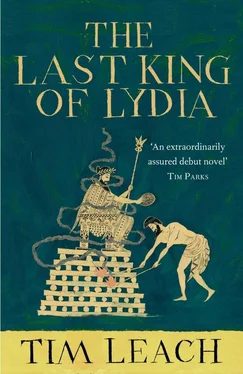Tim Leach - The Last King of Lydia
Здесь есть возможность читать онлайн «Tim Leach - The Last King of Lydia» весь текст электронной книги совершенно бесплатно (целиком полную версию без сокращений). В некоторых случаях можно слушать аудио, скачать через торрент в формате fb2 и присутствует краткое содержание. Год выпуска: 2013, ISBN: 2013, Издательство: Atlantic Books Ltd, Жанр: Исторические приключения, на английском языке. Описание произведения, (предисловие) а так же отзывы посетителей доступны на портале библиотеки ЛибКат.
- Название:The Last King of Lydia
- Автор:
- Издательство:Atlantic Books Ltd
- Жанр:
- Год:2013
- ISBN:9780857899200
- Рейтинг книги:5 / 5. Голосов: 1
-
Избранное:Добавить в избранное
- Отзывы:
-
Ваша оценка:
- 100
- 1
- 2
- 3
- 4
- 5
The Last King of Lydia: краткое содержание, описание и аннотация
Предлагаем к чтению аннотацию, описание, краткое содержание или предисловие (зависит от того, что написал сам автор книги «The Last King of Lydia»). Если вы не нашли необходимую информацию о книге — напишите в комментариях, мы постараемся отыскать её.
The Last King of Lydia — читать онлайн бесплатно полную книгу (весь текст) целиком
Ниже представлен текст книги, разбитый по страницам. Система сохранения места последней прочитанной страницы, позволяет с удобством читать онлайн бесплатно книгу «The Last King of Lydia», без необходимости каждый раз заново искать на чём Вы остановились. Поставьте закладку, и сможете в любой момент перейти на страницу, на которой закончили чтение.
Интервал:
Закладка:
He imagined that those more familiar with such matters could inspect the pattern of the dead and reconstruct the battle from it; where the first men had fallen, where the battle had turned, when the losing side had tried to run. He stared at the heaped mound of Lydian dead on the plains beneath Sardis, not a horse amongst them, and he wondered if they had tried to surrender and had been butchered even as they threw down their weapons, or if they had died fighting to the last man, waiting for a relief that was never going to arrive.
It seemed likely, he thought, that the city would now die too, just more slowly. A death by encirclement that would take months, rather than hours. On its sheer-sided hill, with only a single path leading up to it, Sardis looked like a city that could wait for a thousand years, if only it were manned by automata, and not by men. Without a harvest or foreign traders to supply it, Sardis was not a fortress. It was a tomb.
During the day, the Lydians assessed their dwindling supplies, and looked down at the Persians below. They did nothing else — there seemed little point in doing anything but waiting for each day to pass, both hoping, and fearing, that nothing would change. At night, Croesus imagined that everyone in Sardis must have dreamed the same dream, of exhausted Lydian messengers arriving in foreign courts, of allied armies hastily assembled that would march day and night to reach Sardis and rescue them. Every morning, the people of the city woke from these dreams, flocked to the walls and windows, and stared out to the horizon. But no army came.
He looked down the steep walls, and saw, far below the upper city, the waiting Persians. The scattered buildings of lower Sardis were not sufficient to contain them, and so they had built a new city of their own, a city of tents and animals, an echo of the first settlement that had sprung up in that place centuries before, when a gathering of nomad tribes, tired of wandering and hunting, looked up at the steep hill and imagined a fortress to call their home.
Already, he saw, their encampment bore the marks of civilization. Clear paths had been traced through the tents and masses of waiting soldiers, the grass worn down into roads by thousands of marching feet. Commerce did not take long to establish itself. Even from above, Croesus could see the large clearing on the northern side of the camp that had become the centre of a black market trade, where the soldiers gathered to trade their weapons for food, their food for slaves, then their slaves for weapons again whenever rumours came that an attack was imminent.
From every corner of the waiting army, he could hear music echoing. Men gathered around fires, playing drums edged with metal rings, singing to drive away the cold and the boredom. Every day, Croesus listened to this music as though he were listening to the heartbeat of some great monster. When the music faded away entirely, it would be because the men were too starved to play, and it would be time for them to retreat back to the east.
He turned away from the Persians, and back to Sardis. It was a silent city. In the streets, people tried to talk, but their conversations would soon falter and fade, sometimes even mid sentence. It was the silence of those who are afraid to speak, as though the safe deadlock of the siege were a spell that could be broken by a single misplaced word. The Lydians waited behind their walls, and the Persians in their tents, two cities facing each other, and waited for something to change.
As Croesus began his slow walk back to the palace, to the endless councils of war and meetings that awaited him, a movement caught his eye. It was a young Lydian soldier rushing along the south wall, his helmet in his hand. He was late for his post, no doubt. The king turned away, and gave no further thought to what he had seen.
As this soldier ran along the south wall of Sardis, he tripped on a loose stone and reached out his hands for balance. His helmet slipped from fingers that were still numb with sleep, bounced once on the parapet and tumbled far below.
His name was Ardys. He had overslept, and was going to be late to his post for the second day in a row. Despite the cold air his helmet had stifled him, and he had taken it off as he ran. Now, he would be punished for something much worse than a moment’s lateness.
He saw, by some miracle, that it hadn’t fallen all the way to the ground. It had caught on a tough old bush, its bark gnarled and whorled like ancient skin, that clung to the cliff just as it clung stubbornly to life. One of the branches of this bush had hooked the helmet as it fell, and now it hung there sixty feet beneath him, the bronze giving him a mocking wink of reflected sunlight when the wind stirred the branch.
There was no great reason to go down after it. If he didn’t, his captain would scream abuse at him and shame him in front of the others. He would be assigned the worst duties for a week or so, and be the victim of jokes for somewhat longer than that, but that was all.
He looked down the wall for one last time. Before he knew what he was doing he had slipped off his boots, had hooked his fingers on top of the wall and was gently lowering himself down, searching for a place to put his feet.
On the day of the great sacrifice to Delphi, a year before, one of his fellow soldiers had made a bet that no one would ever climb the south cliff. It was an idle gamble, not meant as a challenge. But Ardys had spent his youth in the mountains, learning the secrets of weight and motion that blank faces of rock reveal to their followers. He had taken the wager, gone to the base of the wall, and begun to climb.
After he had climbed ten feet, they were still yelling insults at him. Once he had climbed thirty feet, they were shouting at him to come back down. By the time he was fifty feet off the ground they had all fallen silent, like men in a temple observing a sacrifice. That silence held until he made it all the way to the very top. He remembered that silence, afterwards, above all else.
There was no one to watch him now as he reversed the climb he had made many years before. With his face so close against the rock, the sound of his breathing was like a hard wind in his ears. At each sharp intake of breath, he felt himself on the edge of panic. On each slow breath out, the fear receded just sufficiently for him to make one more move. Slowly, carefully, he felt his way down the cliff, feeling the grain of the rock beneath his fingertips. A single misplaced hand or foot would be enough to send him down onto the boulders below. He pressed his feet flat against the rock when he could not find an edge, pinching at the tiny holds until his fingers were white with pressure. The more he climbed, the more he became convinced that he could not fall.
Even as he focused almost entirely on the climb, a small part of his mind was free to wonder why he was doing it. Perhaps, he thought, it was to answer a challenge from the Gods, who had placed his helmet there, in the exact place he had climbed once before, as a test of his courage. Perhaps there was no good reason at all.
It seemed as though only a few moments had passed, and suddenly he could feel his left foot brush against the branches. The wind grew strong, the breath of an angry God, and he felt his fear return. He was almost equidistant from safety in either direction. His hands began to shake, and his feet felt as though they were balanced on nothing at all. His weight tugged him back into the empty air. He began to fall.
His eyes found a hidden pocket in the rock just as his feet slid away from him. He jammed three fingers deep into the cliff face, and for one moment he hung there, his hand and arm sharp with pain. Then his right foot found a dent in the rock. Barely an inch wide, yet it felt like a ledge ten times that size. He patted his other hand over the rock face until it found a hold. He was safe once more.
Читать дальшеИнтервал:
Закладка:
Похожие книги на «The Last King of Lydia»
Представляем Вашему вниманию похожие книги на «The Last King of Lydia» списком для выбора. Мы отобрали схожую по названию и смыслу литературу в надежде предоставить читателям больше вариантов отыскать новые, интересные, ещё непрочитанные произведения.
Обсуждение, отзывы о книге «The Last King of Lydia» и просто собственные мнения читателей. Оставьте ваши комментарии, напишите, что Вы думаете о произведении, его смысле или главных героях. Укажите что конкретно понравилось, а что нет, и почему Вы так считаете.












